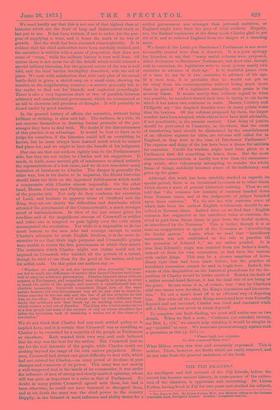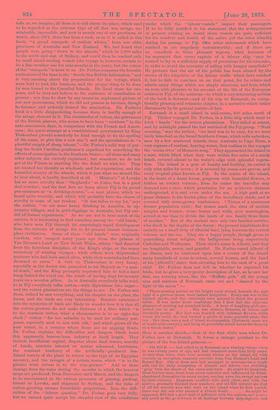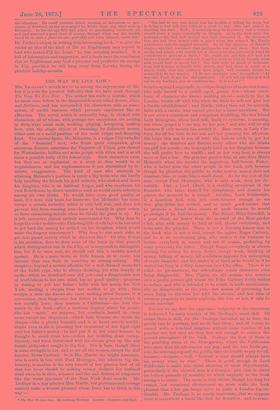THE FIJI ISLANDS.*
AN intelligent and full account of the Fiji Islands, before the record has become ancient history, in consequence of the extinc- tion of the islanders, is opportune and interesting. Dr. Litton Forbes, having lived in Fiji for two years and studied his subject, * Two Years in Fiji. By Litton Forbes, M.D., late Medical Officer to the German Consulate, Apia, Navigator Islands. London: Longman and 00. tells us, we imagine, all there is to tell about the place, which used to be regarded as the extreme type of all that was savage, un- attainable, impossible, and now is merely one of our provinces, to which, since 1871, there has been a rush, or as it is called in this book, "a grand stampede of restless whites," from our older provinces of Australia and New Zealand. We had heard that people were going "down to the islands," which lie 2,000 miles to the north and east of Sydney, and could then be reached only by small island-trading vessels (the voyage is, however, certain to be a fine-weather one for nine months in the year), but the extent of the "stampede" is news to us. Dr. Forbes compares the feverish excitement of the time to the "South-Sea Bubble infatuation," and is very amusing about the preparations for the voyage, which were held to look like business, and the proper thing to be done by men bound to the Cannibal Islands. He lived there for two years, and he does not believe in the existence of cannibalism at present ; nor does he draw by any means an unpleasant picture of our new possessions, which we did not possess in his time, though he foresaw, and ardently desired the annexation. Dr. Forbes's book is a little disappointing, because there is hardly enough of the savage element in it. The vicissitudes of cotton, the grievances of the British planter, who seems to have been " nowhere " in the ante-annexation days, in comparison with the French and Ameri- cans ; the queer attempt at a constitutional government by King Thakombau (would somebody be kind enough to fix the spelling of his name, or give him a new one ?) and the speculations in "a plentiful supply of cheap labour,"—Dr. Forbes's mild way of put- ting the South Carolina gentlemen's expedient for remedying the effects of emancipation in the Southern States;—all these and many other subjects are cleverly explained ; but somehow, we do not get at the Fijians in anything like the detail we wish for. They are treated too literally as wholesale and for exportation, and the beautiful scenery of the islands, which is just what we should like to hear about, is hardly described at all. " Manton's " at Levuka has no more novelty than " Shepherd's " at Cairo, but is a good deal rowdier ; and the first fact we learn about Fiji is its proud pre-eminence as "a drinking-centre,"—a neat phrase, which we heard quite recently, and which will probably have the charm of novelty to some of our readers. "It has fallen to my lot," says the author, "to see some heavy drinking in America, in up- country villages, and in gold-diggings in Australia, but Fiji out- did all former experiences." As we are not to hear much of the natives, it is interesting to find ourselves among the "old hands," who have seen Fiji through its surprisingly rapid development from the extreme of savage life to its present almost common- place civilization. Some of these " old hands" were originally convicts, who escaped many years ago from the prisons of Van Diemen's Land or New South Wales, others " had deserted from the ferocious discipline of the King's ships, or the weary monotony of whaling voyages ; while others were shipwrecked mariners who had been saved alive, while their comrades had been drowned or eaten." A visit to Thakombau is very funny, especially as the doctor was presented to his Majesty as " a man- of-death," and the King promptly requested him to feel a hard lump behind the royal ear, the result of having slept for seventy years on a wooden pillow. As in Australia everybody talks wool, so in Fiji everybody talks cotton—with digressions into sugar— and the cotton plantations are the things to see. Dr. Forbes saw them, indeed he saw everything, and his chapter on the plant, the farms, and the trade are very interesting. Readers uninitiated into the mysteries of trade are likely to wonder how it is that all the cotton-growers do not make fortunes of a fibre which "is to the common cotton what a chronometer is to an eight-day clock ;" cotton "far too valuable to be used for ordinary pur- poses, especially used to mix with silk," and which grows all the year round, in a country where there are no nipping frosts. Dr. Forbes explains the difficulties and dangers which beset this apparently heaven-born industry at lucid length. They include insufficient capital, disputes about land tenure, scarcity of hands, usurious interest on money adyanced, hurricanes, the constant tendency of the artificially - produced Sea- Island variety of the plant to return to the type of. its Egyptian ancestry, and the ravages of a certain worm, which " is to the planter what oidium is to the vine-grower." Add to these damage from the rains during the months in which the heaviest crops are produced, from December until March, and the dangers to be encountered in the various processes of ginning, packing, transit to Levuka, and shipment to Sydney, and the risks of cotton-growing assume formidable proportions. Into the diffi- culties of the "labour question " Dr. Forbes goes very fully, but we cannot quite accept his cheerful view of the conditions
under which the "labour vessels" import their passengers. If he be fully justified in his statement that the arrangements at present existing on board those vessels are quite sufficient for the comfort and health of the native (of the other islands) during his passage to Fiji. then other statements which have reached us are singularly untrustworthy ; and if there are no cannibals in those pleasant regions, what becomes of his argument that every captain of a labour ship "may be trusted to lay in a sufficient supply of provisions for his own sake, in order to avoid the necessity of sailing with hungry cannibals ?" He protests that the ear of the public has been abused by the stories of the iniquities of the labour traffic which have reached it, but he fails to convince us on that point, for he relates and admits many things which are simply atrocious, and from which we turn with pleasure to his account of the life of the European settlers in Fiji, of the missions—to which a very interesting section of the book is devoted—and of his trip to Rotumah, an excep- tionally pleasing and romantic chapter, in a narrative which rather disconcerts by its general matter-of-fact.
Rotumah is a small island in mid-ocean, 400 miles north of Fiji. Thither voyaged Dr. Forbes, in a little ship which went to fetch " hands " for the cotton plantations. They sailed at sunset, and by midnight passed the last sentinel of the Fiji group. "Next morning," says the author, "no land was to be seen, for we were fairly launched on the broad Southern Ocean, which rolls unbroken, save by a few scattered islands, from Australia to Cape Horn, a vast expanse of restless, heaving water, that realises to the voyager the ocean river' of Homeric song." They approached the island in a mist, which lifted when they were within five miles of a sandy beach, covered almost to the water's edge with splendid vegeta- tion. The island is a gem of beauty and fertility, its extent is only nine miles by seven ; it is covered by cocoa-nut groves, and every tropical plant known in Fiji. In the centre of the island, in the heart of a dense forest, gorgeous with beautiful flowers, is hidden an extinct volcano ; from its crater the traveller may descend into a cave, which penetrates for an unknown distance underground, it is said even under the sea. A high peak at no great distance is the burial-place of the hereditary chiefs, and is covered with moss-grown tombstones. "Traces of a numerous former population exist ; flat stones mark the sites of ancient temples and houses ; stone fences and walls, now meaningless, served at one time to divide the lands of one family from those of another." But of the ancient race only two families survive, who dwell in the depths of the forest ; the present inhabitants live entirely on a small strip of alluvial land, lying between the central volcano and the sea. They are a happy people, though given to quarrelling about religion, the belligerents being respectively Catholics and Wesleyans. Their chief's name is Alberti, and they are hospitable, merry, and grateful. Dr. Forbes cured Alberti of an illness, and he conferred upon him a corner of the island many hundreds of acres in extent, several houses, and the hand of his [Alberti's] sister, thus elevating him to the rank of a great chief. Dr. Forbes does not tell us whether he exported his bride, but he gives a very pretty description of her, as he saw her first, one evening when, like the "Buffalo gals," all the young men and maidens of Rotumah came out and " danced by the light of the moon" :—
" These evening parties on the bright coral strand, beneath the pale light of a glorious moon, were indeed delightful. Every one was in the highest spirits, and due restraints were present to check the general mirth. It was under these conditions that I first had the supreme pleasure of meeting my promised bride. A bevy of laughing girls pre-
sented her to me She was sixteen, brunette, of course, and decidedly pretty. Her hair was braided with hybiscns flowers, while round her waist she had twined a girdle of some graceful plant, like ivy. Her dress was a mat of island workmanship [Rotumah mats are of world-wide renown], and hung as gracefully round her as the drapery on a Greek statue."
Here is another sketch,—that of the first white man whom Dr. Forbes met at Rotumah. It forms a strange pendant to the picture of the Sea-Island princess.-
, Old Bill B— had called in at Rotumah on a whaling voyage when be was twenty years of age, and had remained more than forty years. At that time there were over seventy whites on the island, all, with scarcely an exception, runaway convicts from Van Diemen's Land and Botany Bay. One of these men had managed to extemporise a rough still, and the daily occupation of himself and fellows was distilling grog' from the shoots of the cocoa-nut trees. As might be imagined, these lawless men, freed from every restraint and influenced by drink, abandoned themselves to every excess, scaring even the savage natives by their violence. Desperate conflicts with each other, and with the natives, gradually thinned their numbers, and old Bill assured me that of all the seventy men who were on the island when he first landed,
there was not one who escaped a violent death As might ba supposed, Bill had a good deal of influence with the natives, and gener- ally acted as the go-between in all dealings between ship-captains and the islanders. He could procure either seamen, or labourers, or pro- vision, or firewood, as the case might be, better than any other man in Rotumah. In his old age Bill had taken to purchasing cocoa-nut oil, and had amassed a good deal of money, though what use his wealth could be in such a place no one, probably not even himself, could tell."
Dr. Forbes's object in writing this interesting book, " to give the reader an idea of the kind of life an Englishman may expect to lead who makes Fiji his home," he has certainly attained. It is full of information and suggestion, and it leads us to the conclusion that an Englishman may lead a pleasant and profitable life enough in Fiji, provided he will keep away from Levuka during the planters' holiday-months.




































 Previous page
Previous page